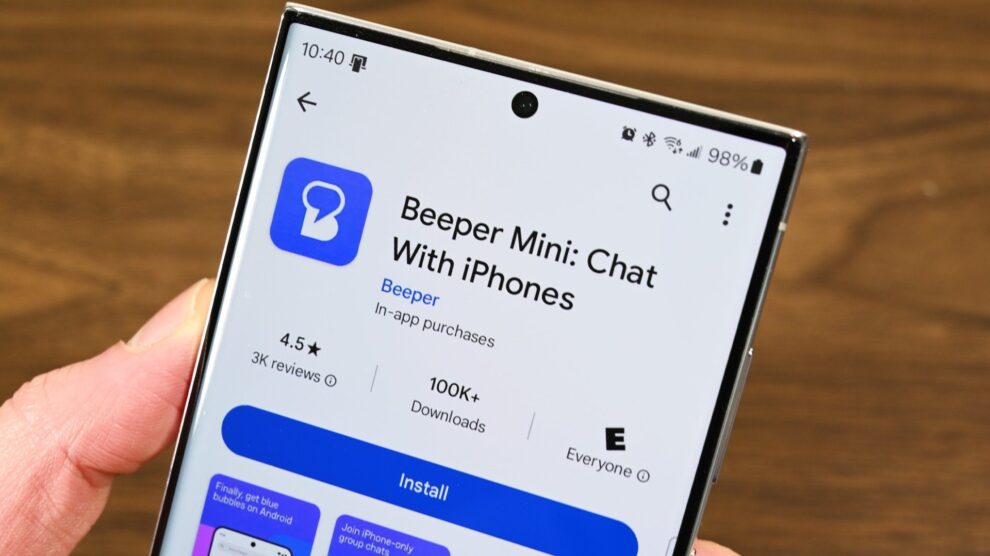Beeper’s Backdoor:
While Beeper initially sidestepped Apple’s walled garden through some clever reverse-engineering, the company has hit a roadblock. To keep things secure and reliable, Beeper Mini now needs users to authenticate their iMessage connection using a Mac. Yep, you read that right. To enjoy iMessage on your Android, you’ll need a Mac sitting somewhere in the background, sending out the secret handshake.
Mac-tivated Confusion:
This sudden Mac dependency has sparked a flurry of frustration. For many Android users, Beeper’s appeal lay in its ability to finally free them from the Apple ecosystem. Now, it feels like a bait-and-switch, a Trojan horse with an Apple logo. Some worry about the ethical implications of tying Beeper to another platform, while others simply lament the inconvenience of needing a Mac just to chat with their iPhone-wielding friends.
Apple’s Long Shadow:
This saga also reignites the debate about Apple’s control over iMessage. Is it fair that one company’s proprietary messaging platform holds such sway over millions of users, limiting their choices and hindering cross-platform communication? Beeper’s Mac requirement, while a temporary workaround, only highlights the issue.
Beeper’s Buzzing Backlash:
The company understands the frustration and promises to find alternative solutions in the future. They’re exploring cloud-based authentication and partnerships with public cloud providers to bypass the Mac dependency. But for now, Android users hoping to escape iMessage’s grip are left disappointed, stuck in a digital limbo with a Mac dangling just out of reach.
The Future of Buzzworthy Communication:
Beeper Mini’s Mac hiccup is a reminder that the quest for truly open and universal communication platforms remains a work in progress. While cross-platform messaging dreams might be on hold for now, Beeper’s efforts continue to push boundaries and challenge the dominance of walled gardens. And who knows, maybe one day, iMessage will truly be free to buzz on any device, no Mac strings attached.
Here’s the gist:
- Beeper Mini initially bypassed Apple’s iMessage restrictions, but now requires a Mac for authentication on Android.
- This has angered users who feel misled and trapped in Apple’s ecosystem.
- Beeper promises future solutions like cloud-based authentication to remove the Mac requirement.
- The saga highlights the ongoing debate about Apple’s control over iMessage and the need for open communication platforms.
So, Beeper Mini fans, take a deep breath and hold onto your Androids. The fight for cross-platform messaging freedom continues, and while the road might have an unexpected detour through a Mac, the destination of open communication remains in sight. Keep buzzing, and maybe one day, iMessage will be truly universal, no Macs required.
The Murky Ethics Behind iMessage Authentication Hacks
When Beeper Mini claimed to enable iMessage on Android devices, many hailed it as a heroic technical feat. But the newly revealed Mac dependency exposes ethical gray areas in bypassing Apple’s walled garden this way.
Is It Truly Legitimate Access?
While ingenious, Beeper’s initial iMessage hack felt questionable to some experts. Reverse engineering hidden APIs and spoof authentication systems has an ends-justifies-means vibe.
Now requiring an entire Mac computer just to validate credentials makes the legitimacy angle even murkier. It essentially uses Apple hardware against its designed purpose.
Why Not Partner Officially With Apple?
Assuming demand existed for iMessage on Android, nothing stopped Beeper from negotiating proper access through official Apple business partnerships.
Instead, they opted for clever technical circumvention over cooperation. But as the Mac requirement shows, unsupported backdoor access inevitably proves limited and fragile.
The iMessage Walled Garden Dilemma
While Beeper’s tactics seem ethically questionable, Apple does shoulder some blame for iMessage’s closed ecosystem. Relying on proprietary technology that actively limits third-party access helps no one.
Two-Sided Coin
On one hand, a private platform allows Apple to ensure optimal quality, security, and reliability. But on the other, it restricts consumer freedom and fractures broader communication.
Platforms like Telegram and Signal manage to balance both openness and controlled integrity. But Apple stubbornly gates iMessage, forcing the Beeper situation.
Time to Open Up
As smartphone choice expands, Apple must decide whether iMessage exclusivity still makes sense. Do marginal quality gains offset stifling interoperability?
With Beeper proving demand for Android access and even creating shady workarounds, perhaps Apple should embrace calls for opening iMessage through public APIs.
What’s Next for Beeper Mini and iMessage?
Despite commendable ambitions to unify messaging, Beeper Mini’s Mac dependency snafu leaves its future unclear. But the lingering iMessage access issue won’t disappear so easily.
Where Beeper Goes Next
Beeper promises alternative authentication methods to ditch the Mac requirement, but will they prove truly reliable at scale?
The company could pivot focus exclusively on other cross-platform chat options too. But without solving iMessage, Beeper loses its most alluring hook for most consumers.
Cracking Apple’s Walled Garden
Meanwhile Apple stays characteristically silent on growing calls to open iMessage access. But with consumer choice expanding, how long can they justify forcing ecosystem lock-in through messaging?
The winds of software history blow strongly toward interoperability. Once unassailable empires like BlackBerry’s collapsed partially due to closed off gardens. Apple would be wise to embrace connections beyond its walls.










Add Comment